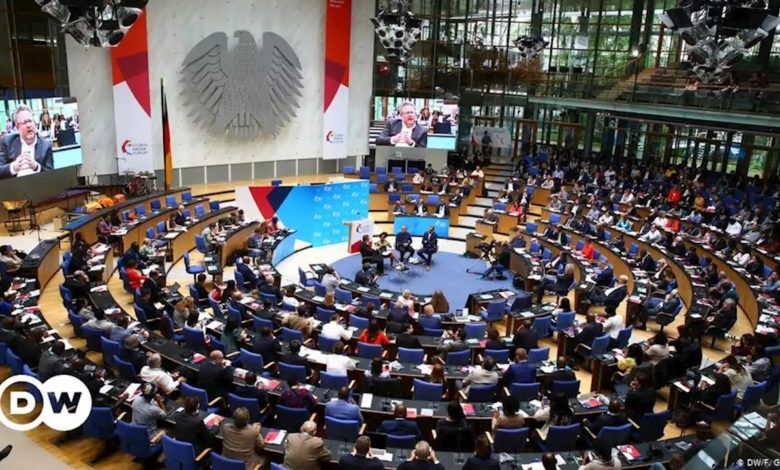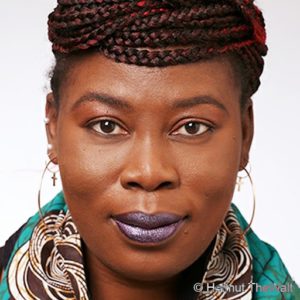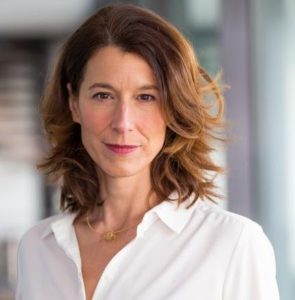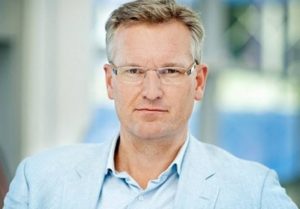#GMF2021: Taking Away More Than A Few Benefits Of Constructive Journalism
On June 14 and 15, Deutsche Welle (DW) held its 2021 Global Media Forum (GMF), an interdisciplinary and international conference on ‘Disruption and Innovation.’

It is obvious why this year’s Global Media Forum (GMF), live-streamed from Deutsche Welle (DW) headquarters in Bonn, Germany, dedicated a good chunk of time to discuss Constructive Journalism (CJ).
The world is saturated with negative news, a good part of which are about acts of terrorism in parts of West Africa and countries like Syria, Israel/Palestine, and many others. No wonder some, particularly Nigerians, are afraid of the news as insecurity persists.
This is where CJ comes in to douse the tension, the panelists interrogating the topic, ‘Exploring Constructive Journalism,’ unanimously agreed.
With DW’s Javier Arguedas as host; Ruona Meyer, Africa Initiative Manager, Solutions Journalism Network; Ellen Heinrichs, DW’s Head of Trends and Knowledge; and Ulrik Haagerup, Founder and CEO, Constructive Institute; the discourse took a decisive direction.
An emerging approach to reporting, CJ is described as “response to increasing tabloidisation, sensationalism, and negativity bias of the news media today. It is an approach that aims to provide audiences with a fair, accurate and contextualised picture of the world, without overemphasising the negative and what is going wrong.”
As disruptive developments call for radical innovations and digitisation causes a dynamic shift that changes everyday living, there is information overload, a situation that needs the intervention of CJ.
How can journalism provide solutions instead of problems? To what extent can the newsroom go beyond the who, what, when, where, why, and how?
These are the questions Meyer, Heinrichs, and Haagerup responded to in their session.
Misconceptions: African journalism and colonialism
Meyer stressed that the biggest misconception about Constructive Journalism is that it needs to be put in a box. “That it has to be funded by some external party before it can be done,” she said. But then, this is changing in Africa, particularly based on the work that the Institute of Constructive Journalism and the Solutions Journalism Network are doing.

She pointed out that “one of the things we lay blame on is that some parts of our funding aid systems in Africa are actually arranged along the lines of colonialism.”
Fortunately, this does not happen in journalism and “putting Africa in a colonial box must be avoided.” For instance, Meyer said, the United Kingdom funds Commonwealth countries, Portugal has arrangements with Brazil, and France focuses on Francophone countries.
“We need to continue guarding against that happening to journalism,” she concluded.
Business case
“Yes, absolutely,” was Heinrichs response to whether there is a business case for CJ.
She explained that there is more and more evidence that CJ is good for business as well and not just for societies.
“When we have breaking news, there will be lots of clicks and users, but people leave very quickly. They would read your headline and be gone,” Heinrichs said.
A research Heinrichs conducted in Germany got her talking with a lot of colleagues about reporting for the international market at DW. All the respondents said people tended to stay longer if their reporting included some sort of solution, surprising angles, a different perspective, or diversity.
“If you are a company relying on the advertising business model, those users you have got would be exposed to advertisement much longer and might even be in a much better mood because they don’t feel frustrated by the negative focus of the reporting,” she added.

Then there is the matter of subscriptions. Heinrichs talked to a regional German newspaper that had figured out that solutions reporting did actually contribute to subscriptions. They saw a lot of conversions they could track back to constructive reporting.
“There’s great evidence that constructive journalism does make a business case,” she concluded.
Best approach to Constructive Journalism?
A good starting point to Constructive Journalism, according to Ulrik, is to go out on the streets and ask simple questions like, whether people need more information or more news. Also, whether they need it “faster.”

“We all know people will answer that they don’t need more news but better news,” Ulrik said. “They need someone to clean up the mess.”
Ulrik pointed out that the first step is to listen to “people and ourselves and decide to tell important stories that engage.”
In her response to the question, “To what extent is Constructive Journalism limited to a handful of topics and how can we cover all sorts of stories?” Meyer advocated for teaching different people in a form relevant to their lifestyle, needs, and learning levels.
“One of the good things that the Constructive Journalism institute has done is to get academics, journalists, and civil society members to sort of design one of their curriculums,” Meyer said. “That is the kind of example I am talking about.”
Then she expounded on the work SJN does. The network has resources in about 17 languages. They also believe in a train-the-trainer approach to further develop this.
A typical example of SJN’s diversity in practice is understanding that there are people who think WhatsApp is the best place to teach, while some prefer PDF files as opposed to Zoom.
So, they pay attention to detail down to the shaping of their content. “Just like the way investigative journalism practised in Africa is different from how it’s done in the United States,” she added.
GMF 2021
This year’s GMF brought together 42 speakers from across the world including Angela Merkel, Federal Chancellor of Germany; Armin Laschet, Minister-President of the State of North Rhine-Westphalia; and Leymah Roberta Gbowee, Women Rights Activist and Nobel Peace Laureate.
Discussions revolved around topics such as the relationship between social media and journalism and how media can benefit from the innovative powers of these intermediaries while strengthening journalism at the same time.
They took a look at technology, especially Artificial Intelligence (AI), and how it can be used for good, the coronavirus pandemic, pollution, and political upheaval.
There is also the issue of online fundraising in the area of media business, how COVID-19 is changing diplomacy, and much more.
Curator of the GMF, DW, is a German public state-owned international broadcaster funded by the country’s federal tax budget. The service is available in 30 languages.
Support Our Journalism
There are millions of ordinary people affected by conflict in Africa whose stories are missing in the mainstream media. HumAngle is determined to tell those challenging and under-reported stories, hoping that the people impacted by these conflicts will find the safety and security they deserve.
To ensure that we continue to provide public service coverage, we have a small favour to ask you. We want you to be part of our journalistic endeavour by contributing a token to us.
Your donation will further promote a robust, free, and independent media.
Donate HereStay Closer To The Stories That Matter




